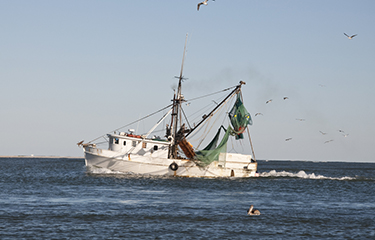A third of shrimp labeled “local” wild shrimp in North Carolina was actually imported farmed shrimp, a new study found.
A forensics sciences class at the University of North Carolina at Chapel Hill obtained shrimp samples from 60 grocery stores and seafood markets across the state, and found that 35 percent mislabeled local shrimp at least once. That is consistent with the mislabeling rate on shrimp nationwide, the students wrote in the article published on BioRxiv.
“Although this frequency is lower than that of other species in North Carolina, e.g., red snapper…. the results suggest shrimp mislabeling is a fairly common problem across the state,” they wrote.
The students used standard DNA barcoding procedures to determine the species identity of 106 shrimp sold by 60 vendors across North Carolina as “local” shrimp. The incorrectly-marketed “local” shrimp was actually whiteleg shrimp: A farmed, species imported from the eastern Pacific and not found in North Carolina waters.
The mean price for mislabeled shrimp was USD 11 (EUR 9.96) per pound, compared to USD 13.20 (EUR 11.95) per pound for correctly-labeled shrimp, which could indicate that the shrimp mislabeling was not economically driven and might have been unintentional by the purveyors, Jack Cheney, contributing writer for Sustainable Fisheries UW and sourcing director for Real Good Fish, told SeafoodSource.
“If they were looking to make money on cheaper shrimp, why wouldn't they hold the price point to the same level as true local shrimp and collect the surplus? This suggests the mislabeling might have occurred farther up the supply chain than was tested in this study,” Cheney said. The authors do recognize that it's hard to determine where the mislabeling occurs in the supply chain and most studies in this genre have failed to do so, Cheney added.
“In addition to the negative ecosystem consequences of shrimp farming (e.g., the loss of mangroves forests and the coastal buffering they provide) and seafood importation, North Carolina fishers – as with local fishers elsewhere – are negatively impacted when vendors label farmed, frozen, and imported shrimp as local, fresh, and wild-caught,” the students wrote.
Despite the fact around 90 percent of the shrimp consumed in the U.S. is imported, 92 percent of North Carolina consumers surveyed by NC Sea Grant indicated they prefer to eat local seafood over imported seafood.
In response to increasing pressure on commercial fisheries from seafood imports, organizations in North Carolina and other states have conducted outreach to consumers encouraging them to “eat local seafood.” For example, NC Catch is a local seafood advocacy organization in North Carolina that provides information on vendors that sell local seafood. The intent is to give consumers the tools to make informed decisions regarding seafood purchases that support the local fishing industry. However, this is only effective when seafood products are represented accurately, they wrote.
Plus, locally-caught wild white shrimp are considered a smart seafood choice by the National Oceanic and Atmospheric Association (NOAA) because the fishery is sustainably harvested and managed in the South Atlantic and Gulf of Mexico. White shrimp populations are above target levels, and gear restrictions, such as the required inclusion of turtle excluder devices and bycatch reduction devices, are in place to minimize impacts of trawling on benthic ecosystems.
“Mislabeling has a myriad of potential consequences, including exacerbating over-fishing, negative impacts on human health, and perpetuating human rights abuses in international fisheries,” the students wrote.
According to the authors, shrimp farming poses a number of environmental risks, including mangrove destruction and the associated loss of native biodiversity and ecosystem services.
“Shrimp farms often use large doses of antibiotics to prevent the spread of disease, which can contribute to antibiotic resistance in both shrimp and human populations. Some antibiotics used, such as enrofloxacin and chloramphenicol, are not advised for human use due to risks of cancer and immune system damage,” they wrote.
Plus, they listed human rights concerns including slavery practices in Thai fishing vessels. “Exposure of these practices led to a consumer movement to eat seafood that was both environmentally sustainable and ethically harvested. Mislabeling imported shrimp as locally-caught shrimp undermines the power of the consumer to spend their money in a way that aligns with their moral principles. This also fosters consumer distrust in the seafood industry, which could lead to decreased spending on seafood products,” the students wrote.
However, the authors failed to acknowledge that some whiteleg vannamei shrimp is farmed and harvested responsibly, Cheney said.
“Sure, much of it is not still and indeed this species is associated with some of the least sustainable and most disturbing human rights violations in any global food system,” Cheney said. “But to imply that 100 percent of vannemei shrimp is directly associated with slave labor is an unfair generalization that needed a qualifier in my opinion.”
Photo courtesy of Shutterstock







